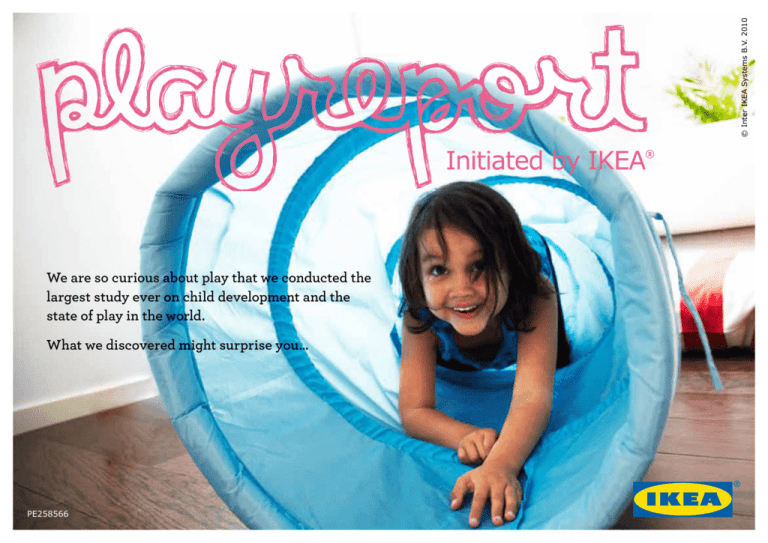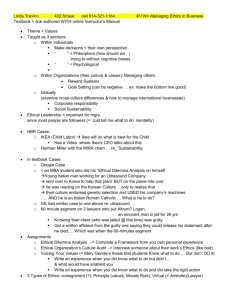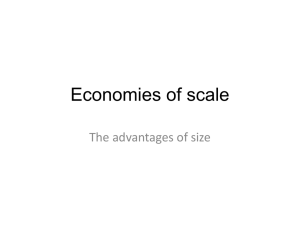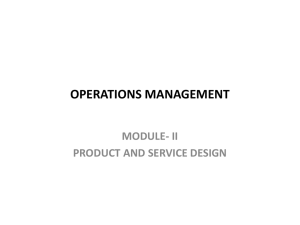Play Report
advertisement

© Inter IKEA Systems B.V. 2010 We are so curious about play that we conducted the largest study ever on child development and the state of play in the world. What we discovered might surprise you… PE258566 Play more together at home! At IKEA, we believe children are the most important people in the world and the home is the most important playground. With the Playreport, we’ve engaged parents and children from across the world to participate in a conversation around child development and play. Our aim is to increase awareness, start meaningful discussions – and hopefully get parents and children to play more together in the process. PE250023 The Playreport is pretty serious stuff 3 Some surprising results 4 Share, collaborate and play more 7 Meet Dr. Play 8 The furniture dealer’s playbook 10 Children’s IKEA: Furnishing activities 11 IKEA’s Headmaster 14 Children’s IKEA and safety 15 The most important people in the world 16 IKEA soft toys campaign 17 Details of the global survey 18 More information 18 3 The Playreport is exactly what it sounds like -- a report about play. More specifically, it’s the largest research project ever conducted on parenting, children and the state of play around the world. We took 10,000 interviews (7,500 grown-ups and 2,500 children) across 25 countries to collect all the information compiled in the Playreport. That’s a lot of data about something most of us forget how to do in our teen years, but then again, we consider play to be serious stuff. On our global Facebook page “Make the world play more – Playreport”, people can interact with results from our research, start new conversations, view and upload video and pictures, and discover how to create a better life at home for children and parents alike. The Building Blocks A collaboration with parents and experts The first phase of the Playreport collaborated with a handful of active parents, online voices and child development experts from three countries (U.S., Switzerland, China) to uncover some of today’s universal issues around child development. A formal research initiative We co-defined the report based on the day-to-day needs and concerns of parents in three key continents. We investigated these issues globally in formal research conducted across 25 markets, sampling 300 parents and 100 children in each. Share the results and further collaborate To share the results and encourage collaboration, IKEA has created a social media group on Facebook, YouTube and beyond so that people can share their knowledge, steer the conversation and dig deeper into the topics that interest them most. PE238120 The Playreport is pretty serious stuff 4 Some surprising results… Nearly half (45%) of all parents think that play is best when it’s educational. This rises to two thirds of parents in China, Slovakia, Czech Rep, Spain, Hungary, Russia, Poland and Portugal. A further minority at 17% (China, Italy, Russia and US) actually prefer their children to learn things rather than to simply play. 27% think play should always have a purpose. As for the children, 51% actually prefer to play rather than learn. Children overwhelmingly prefer playing with their friends and parents over watching TV. When children across the world were asked to choose between watching TV or playing with friends or parents, they overwhelmingly choose to play with friends (89%) and parents (73%) with TV a very poor substitute for social interaction at only 11%. Parents are too stressed to play. 45% of parents surveyed agree that they feel they don’t have enough time to play with their children. Even when parents do find the time to play, a significant minority feel too distracted by other concerns to enjoy it; 26% agree that they are ‘too stressed to enjoy it’. PE242877 Nearly half of the parents think play should be educational. Children disagree. 5 A majority of parents want more creativity at home for their children. The question is how? 89% of parents agree that play is important to encourage their child’s imagination and creativity. And almost all, 93% agree that it’s an essential part of the way a child develops. And 71% feel that they should ‘encourage more creativity at home’, but that they don’t know how. Not all parents want their children to be happy. 72% of parents selected happiness as single most important wish for their children. But what about the other 28%? Well, financial success came second and thoughtfulness of others a close third. PE250132 6 “A pony” Children of the world speak their minds Responses from children 7-12 years inviting them to describe, in their own words, “If you could wish for anything, what would it be?” “To grow up to 16” “I would wish that me and my mum could spend more time with each other and go to the park and bake things. I would wish that we could all eat together like a proper family (with no TV.) I would like to do art with my mum and Christmas cards and decorations.” “A time machine. A library” “That my school friends lived closer so that we could meet up and play more, especially at the park” “To have my nanny back from heaven as she used to play with me a lot and let me do fun things! That’s it” “To be a bike champ” PX000856 7 Share, collaborate and play more On our Facebook page “Make the world play more – Playreport”, people can do all the great things that they’re used to doing on Facebook, related to the Playreport. On YouTube, we’ve created a channel that will be a hub for user generated videos. While it’s great if people simply want to read the survey results from the Playreport, more than anything, we’d like to start an open dialogue about play. Since both Facebook and YouTube are both open, free and easy for people to use, we thought they’d make perfect online partners for this project. IKEA is launching a Playreport app for the iPhone and iPod Touch that helps parents and kids play actively together. The concept of the app is based on the idea that game play should involve a parent, a child and the iPhone. It’s not just a list of games, but a multi-player application packed with activities that make real life play inspiring, active and fun for kids and their parents to enjoy together. The free app will launch with several favorite games from around the world, and more will be added throughout the year. 8 Meet Dr. Play Heading up the Playreport research has been Dr. Barbie Clarke, CEO at Family Kids and Youth, one of the world’s foremost youth research agencies. As an international researcher for over 20 years, she was the perfect match for this project. Dr. Clarke oversaw an online survey in 19 languages, carried out in 25 countries. A total of 10,000 people – 7,500 parents and 2,500 children, aged 7 to 12 – were asked fifty different questions about play and their lives at home. Barbie completed her PhD in child and adolescent psychosocial development at the University of Cambridge, Faculty of Education, where her research has looked at early adolescents’ use of digital media. Barbie is spokesperson for the MRS on children’s research. She is LEA Governor of a Primary School, and sits on the BBC Children’s Editorial Advisory Board. “The state of childhood is very good out there...” What are the Playreport’s major findings when it comes to children’s development and play? It’s a very large and rich report, and it’s difficult to sum up in a few words. But I think one of the most interesting findings was that children want to be social more than anything else. ing and thinking up games of their own. It busts quite a few myths we have about childhood today. I also found it interesting that over half of the children interviewed thought they were good at making friends. It’s really a healthy picture. The state of childhood is very good out there, I think. In our study 30 per cent of children chose playing with friends as their single favorite pastime, more than any other choice. The second favorite activity was playing video games (15 per cent) and then came playing with their parents at 10 per cent. Nine out of ten children prefer playing with their friends over watching TV. I think that’s quite reassuring since playing with friends is an important part of child development, helping them to form social skills and to interpret emotions. We may think that children are always stuck in front of a screen of some sort, but that doesn’t seem to be the case. In fact, half of the children interviewed want to make up their own activities. They don’t want things to be imagined for them, they want to be creative. They don’t need masses of toys and games, they instead need to be out there play- Dr. Barbie Clarke, CEO at Family Kids and Youth 9 You have a solid experience in this field. Are there any findings in this report that surprised you in any way? One thing that I found very interesting is who parents trust. Today, most parents have access to an immense amount of information, all about parenting. However, the sources they go to most for information and advice on parenting are their own parents. Despite all of the books, magazines, internet sites, etc., parents turn to their mums or dads to find out “What shall I do about this or that?” This would not have been surprising 15 or 20 years ago, but now, when there’s a whole industry about parenting, it is. It says a lot about who parents really trust. The report states that time pressure – not having enough time for their children – is one of the major concerns for many parents today. What are your thoughts on this? We frequently hear this from parents. 45 per cent of the parents in the report said that they didn’t have enough time to play with their children. 55 per cent said that they didn’t spend enough quality time with their children. Three quarters of parents said that they wanted more time to just chill out with their children. We live in a cash-rich – time-poor society. What’s interesting however, is that parents today spend four times more time with their children than they did in 1975. So actually we’re spending more time with our children, but we’re feeling more guilty than ever. I think is partly due to the modern emphasis and awareness about child development in general. Parents feel that they need to stimulate their children, spend time with their children, entertain them, from the moment they’re born. This pressure to stimulate your child all the time – which is based on the notion that child development correlates directly with their intelligence – is true to some extent, but it can be overdone. I think some overly conscientious parents risk overworking their children. And the child probably doesn’t appreciate it. The idea that I have to spend time with my children, stimulate them, educate them, look after them –– when actually the most important thing is to engage with your children, engage emotionally. They don’t necessarily need parental or adult input all the time. Kids need to be given barriers, shielded from harm, obviously, but you don’t need to be on their case all the time. What do children think about this? Two out of five think their parents worry about them too much, which is quite high when you consider that picking up on parental concerns requires a somewhat sophisticated awareness. Children are saying: you worry too much. And remember, these are children only up to twelveyears-old; they’re not teenagers, who always think their parents worry too much! PE254354 10 The furniture dealer’s playbook Why is a furniture company concerned about child development and play? First and foremost, we at IKEA are concerned parents too! We believe that the home is the most important playground in the world for both children and parents. Because of this, our team has been dedicated to making Childrenʼs IKEA a line that sparks creativity, imagination and joy. Over the years, we’ve learned a lot about living with children – from collaborating with the world’s leading children’s experts, speaking to parents and studying children and their everyday life at home. All this knowledge goes into everything we do; enabling us to design products that are functional and safe while supporting children at every stage of their development. We hope that the information accumulated in the Playreport will help us to find new and interesting ways of approaching product development, as well as in communicating with parents and children, both online and offline. PE223264 11 CHILDREN’S IKEA Furnishing activities for kids From waking up as a kangaroo to going to bed as a racecar driver, play is a child’s full-time job. And it’s a job to be taken seriously. Because it’s more than just fun and games – but the basis for how children learn, develop and become who they are. When creating products, IKEA collaborates with experts from many different fields of children’s development. That’s how we learn about things like safety – and how different kinds of play stimulate different kinds of development. Then IKEA consults the real specialists, children themselves. We ask them to play with our products just as they wish. And by seeing the world through their eyes, IKEA tries to create the kind of playmates that enable children to hop, swing and play - any way they want. PE258557 12 PE214927 Short-order cook PE214928 Furniture that’s true to life is a great way to spark role-playing games. And by imitating grown-ups and inventing their own roles, children get to practice real-life social skills, like sharing, team play and empathy. DUKTIG cookware, stainless steel colour DUKTIG kitchen utensils, multicolour PE253850 Spin, swing and rock DUKTIG mini-kitchen, 108x40x72 cm, birch plywood/white Spinning, swinging and rocking helps children develop their coordinated movement, something they practice as they move back and forth. Second it helps children to gather and organize their sensory impressions; i.e. smell, touch, sight, hearing and taste. These sensory impressions give children their body perception, which allows them to move their arms and legs without having to observe each movement. Relaxing is just as essential to development as playing, and a swing is a good place for children to wind down. When they swing slowly, the movement sends calming signals to the brain and feelings of well-being to the whole body. As a result, this helps with creative thinking and problem solving. EKORRE rocking-moose, red/ rubberwood PE257027 IKEA PS LÖMSK swivel chair, blue/white PE242189 PE130309 13 PE229358 MÅLA paint/draw storage PE142796 PE182819 MÅLA felt-tip pen/stamp assorted colours MÅLA drawing paper roll PE078343 MÅLA chalks, assorted colours PE233604 MÅLA apron w long sleeves, green Drawing trains concentration PE130221 When children draw and paint, they learn to shut out surrounding distractions. Through their work they get to reveal their emotions and sort through different impressions, helping them to get a better understanding about themselves and the world around them. MÅLA easel, softwood PE209805 MÅLA water colour PE253796 14 The Manager of Children’s IKEA School stresses the importance of play: “For children, play is life itself” What is IKEA Children’s School? Children’s school is an internal program that aims to spread knowledge about children, their needs and their life at home to all relevant parts of the IKEA organization. It was initiated in 1995 by the founder of IKEA, Ingvar Kamprad, and has been an integrated part of Children’s IKEA ever since. Why a school? For IKEA, children are the most important people in the world. Supporting them through their childhood with extensive knowledge and products that meet and promote their development is a true affair of the heart for us. Having a dedicated children’s school is the best way, as we see it, to make sure key competences within the organization, from product developers to copywriters, really understand and embrace the essence of our vision. A furniture company concerned with child development might be surprising to some… Indeed, but we’ve gathered an extensive amount of information over the years. We’ve always worked very closely with leading experts from around the world on children and children’s development. Teaming up with external educators, professors and scientists is also a good way to open up our minds to new practices and disciplines. Still, the last thing we want to do – and this is very important – is to try and tell parents what is right or what is wrong. We can only share as much of our own knowledge as possible. How does the Playreport fit in this picture? Play is a fundamental aspect of children’s development. Through this global research, we’ve gathered new insights about how play is perceived by children and parents all over the world. It will help us to have a better understanding of the meaning of play in different cultures, and allow us to meet parents and children with more relevant ”play products”. What’s your main take from the report? Although the report concludes that the meaning of play and the way children play differs widely around the world, all parents and children agreed that play is of fundamental importance. It’s maybe not surprising, but nevertheless encouraging to read. With the Playreport in mind, what can we expect from IKEA? We will, of course, use our new insights to further improve our children’s range, making it more relevant – and more supportive – to parents and children all over the world. How and when is, however, a little too early to say. PE197572 Maria Elander is the head of IKEA Children’s School, an integrated part of Children’s IKEA and a driving force for an increased knowledge about children, their needs and development. 15 When it comes to safety, we side with the many children Who thinks about safety when having lots of fun? Not kids, they’ve got more important things to do – so it’s our responsibility to see the hidden dangers. By following the strictest international PE243515 laws for any safety risks in our products, we make child safety our top priority. Because children should be free to play the way they want. 16 The most important people in the world Every child has the right to a healthy, secure childhood and access to quality education. That’s why IKEA Social Initiative supports UNICEF and Save the Children on various projects to give children a better start in life. IKEA Social Initiative’s mission is to improve the rights and life opportunities of the many children, creating substantial and lasting change.Long-term commitments are focused on providing PE266887 children with a healthy start in life, access to quality education and empowering women. These projects run mainly in India. IKEA Social Initiative’s more short-term projects, are typically funded through our annual Soft Toy campaign, and take place in more than 30 countries. Today, IKEA Social Initiative supports projects that benefit an estimated 100 million children. 17 The IKEA annual soft toys campaign Through the annual “One dollar is a fortune” campaign during the holiday season IKEA Social Initiative supports educational projects in Asia, Africa and Central and Eastern Europe. One dollar is enough to provide five children with schoolbooks for one whole year. Just imagine how much IKEA stores and our PE256464 customers all over the world can accomplish – schools, teachers, books…. Since 2003, over 30 million dollars worldwide have been donated to projects in more than 30 countries, benefiting 8 million children. These projects are managed by UNICEF and Save the Children. 18 Details of the global survey Survey fieldwork was carried out online in 25 countries by international research consultants, Research Now, London. Youth research consultancy, Family Kids and Youth partnered with IKEA to design the questionnaire, analyze the results and provide an overview of child development and background to the importance of play. The countries surveyed were: Austria, Australia, Belgium, Canada, China, Czech Republic, Denmare, Finland, France, Germany, Hungary, Ireland, Italy, Japan, Netherlands, Norway, Poland, Portugal, Russia, Slovakia, Spain, Sweden, Switzerland, UK and USA. More than 7,500 Internet-based interviews were conducted with parents (10 minutes duration) and 2,500 interviews with children (4 to 5 mins) during October and November 2009. In each country: c. 300 parents of 0-12 year olds interviewed (50% mothers, 50% fathers) c. 100 children aged 7-12 interviewed As all interviews were conducted via the Internet, these survey and report findings only represent the views of parents and children with Internet access (usually at home), sometimes referred to in the Playreport report as ‘online parents/children’. In surveyed countries where Internet access incidence is relatively low, the views of those in rural areas may be underrepresented. Because of sampling confidence intervals, caution should be exercised when findings are used. Generally, parent data differences between countries should equal or exceed 10 % points to merit comment and differences between parent data for one country and the IKEA Index average (a straight, weighted average of all 25 country datasets) should equal or exceed 7% points. Corresponding required differences for the children’s survey data are approximately 15 and 10 % points. More information http://www.facebook.com/playreport © Inter IKEA Systems B.V. 2010 For the most important people in the world Play comes naturally. MEDIA CONTACTS Tamara Robbins Griffith National Public Relations Specialist IKEA Canada T: 905-637-9440 x6237 E: tamara.robbinsgriffith@ikea.com Images and product loans are available for editorial credit. Please contact: Stephanie Smith National Product Loans Specialist c/o IKEA Etobicoke T: 416-646-8182 x2305 E: stephanie.smith@ikea.com www.IKEA.ca PE253047






